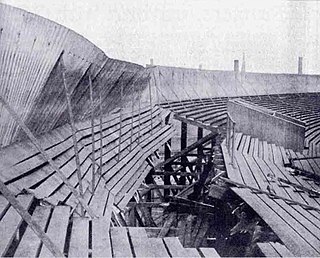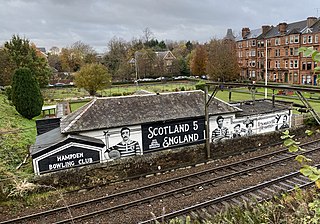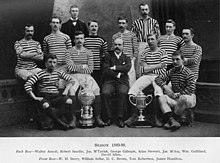The International Roll of Honour is a list established by the Scottish Football Association recognising players who have gained 50 or more international caps for Scotland. The roll of honour was launched in February 1988, when 11 players had already achieved the distinction. Each player inducted receives a commemorative gold medal, an invitation to every Scotland home match and has their portrait hung in the Scottish Football Museum.
Gordon Smith was a Scottish footballer. He is the only player to have won a Scottish league championship with three clubs: Hibernian, Heart of Midlothian, and Dundee. Smith also represented Scotland and the Scottish League XI.
Lawrance Reilly was a Scottish footballer. He was one of the "Famous Five", the Hibernian forward line during the late 1940s and early 1950s, along with Bobby Johnstone, Gordon Smith, Eddie Turnbull, and Willie Ormond. Reilly is rated amongst the top forwards in Scottish football history and was inducted into the Scottish Football Hall of Fame in 2005.
George Lewis Young was a Scottish footballer who played as a defender. He is best remembered for his 16-year association with Rangers and for being the first player to receive more than 50 caps for the Scotland national team.
John Miller "Ian" McColl was a Scottish football player and manager. McColl played as a defender for Queen's Park and Rangers, while he also represented both the Scotland national team and the Scottish League. After retiring as a player, he managed the Scotland national team and English club Sunderland.

The 1901–02 British Home Championship was an international football tournament between the British Home Nations which was meant to herald the arrival of the full professional game of football as both England and Scotland fielded fully professional teams for the first time. The championship was however dominated and overshadowed by a disaster during the final deciding match between England and Scotland at Ibrox Park, which claimed 25 lives. Six minutes into the game, a section of the wooden West Tribune Stand suddenly collapsed due to heavy rainfall the night before. Over 500 people were injured as the stadium was packed to its 68,000 capacity for the match. Although play was stopped in the immediate aftermath of the disaster as players, police and stewards rushed to aid the injured, it was later continued. The continued match finished 1–1 despite the players' reluctance and repeated pauses to allow police and injured spectators to cross the pitch. After the match the Scottish and English Football Associations decided to void the result, and the match was replayed at Villa Park. All proceeds from the replay were contributed to the Disaster Fund set up to aid victims of the accident.

The Scotland national football team represents Scotland in international association football and is controlled by the Scottish Football Association. It is the joint-oldest national football team in the world, alongside England, Scotland's opponents in what is now recognised as the world's first international football match, which took place at Hamilton Crescent in Glasgow in November 1872. Prior to this, a series of matches had been played between teams representing the two countries, but the Scottish team was drawn almost entirely from players based in and around London and these games are now not regarded as full international matches. The lack of involvement by players from Scottish clubs in these matches led to some controversy, which was resolved when The Football Association arranged to send a team to play in Glasgow, where the English players took on a Scotland team composed entirely of players from the Queen's Park club.

This article lists the results for the Scotland national football team between 2000 and 2019.
The 1895–96 British Home Championship was an edition of the annual international football tournament played between the British Home Nations. Despite England achieving an almost record 9–1 victory over Wales, the trophy was won by Scotland who won two and drew one of their matches, the draw coming in a hard-fought duel with Ireland.

This article lists the results for the Scotland national football team between 1960 and 1979.
Robert Scott Gibson Neill was a Scottish footballer who played for Hibernian, Liverpool, Rangers and Scotland. He played at centre half and at wing half.
Mark Dickson Bell was a Scottish footballer who played for Heart of Midlothian in the early years of the 20th century, helping them to win the Scottish Cup in 1901, before moving to England where he won Southern League championships with Southampton and Fulham. An outside forward capable of playing on the left or right wing, he won one international cap for Scotland in 1901.
George Brown Key was a Scottish international footballer who played in both the Scottish and English football leagues.

George Gillespie was a Scottish footballer who played for Rangers (1876–1883), Queen's Park (1884–1892) and Scotland in the late 19th century.
Robert Glen was a Scottish footballer who played for Renton, Sheffield Wednesday, Rangers, Hibernian and Scotland.
Pollokshields Athletic F.C. was a Scottish football team, based in the Pollokshields district of Glasgow.

Hampden Park was a football ground in Crosshill, Renfrewshire. The home ground of Queen's Park from 1873 until 1883, it was the first of three stadiums to bear the same name, and hosted the first-ever Scottish Cup final in 1874.

From 1870 to the present day, the Scotland national football team have played various matches that are not accorded the status of official (FIFA) internationals by the governing body, the Scottish Football Association. These include early matches against England prior to the first-ever official international in 1872, wartime fixtures between 1914–1919 and 1939–1946 when official competitions were suspended, overseas tour matches played by a Scotland XI of varying strength and status, and others as specified.








